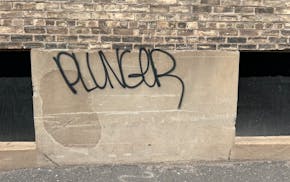Minneapolis police officer Mike Kirchen hopped off his bike on a recent afternoon and strolled through the Cedar-Riverside neighborhood, home to the largest Somali immigrant population in the United States.
An hour into his shift, he had given stickers to curious children, stopped traffic to help a woman cross a busy street, moved loitering teens away from a market and talked with a business owner who wanted to file a police report.
Kirchen's work is one thread in a federally funded community-policing initiative begun in January 2013. In a groundbreaking attempt to strengthen ties with Minneapolis' Somali community, police are working with elders and young people, probation officers, courts, city and county attorney's offices, business owners and law enforcement experts.
In 2011, the U.S. Justice Department's Bureau of Justice Assistance awarded a $600,000 grant to the Washington, D.C.-based Police Executive Research Forum (PERF), which in turn chose Minneapolis' Somali-American community as its subject.
Justice officials said they were impressed by Minneapolis' work so far to build trust with its immigrant population. But they also made it clear they want the project to result in a national model other cities can replicate.
"There is lots of research out there that points to the importance of how officers treat people and how that translates in building relationships, but this is one of the first projects that attempts to take those concepts and put them into operation," said Chuck Wexler, PERF's executive director.
When planning for the project started in 2012, police had already made some inroads in the area. At least two Somali-born officers were patrolling Cedar-Riverside, and a safety center had been opened in Riverside Plaza. Crime was already declining, so crime reduction did not need to be the overriding goal.
Philosophically, the project plays out at the intersection of "procedural justice," which is how an officer shows objectivity and respect in interactions with people, and "police legitimacy," a broader community acceptance of police authority and actions as fair and just, Wexler said.
Among the ways the department made those concepts concrete was by adding officers, providing cultural training, printing business cards with officers' cell numbers in Somali, focusing on young chronic offenders and hosting community events.
"The whole project engages an underserved community that requires special needs," Wexler said. "The Somali population had a lot of challenges coming to this country."
Letting voices be heard
A couple of years before the project became reality, the community was reeling. Young Somali-Americans were being recruited to fight for terrorist groups in war-torn Somalia. A few community members were charged with funding terrorist activity. And in early 2010, a Somali man was charged with killing three people in a Seward market.
Although densely populated, the community hadn't seen the type of police presence that it now is experiencing, said Russom Solomon, owner of the Red Sea Bar & Restaurant. Solomon, who is active in several West Bank and Cedar-Riverside associations, said the initiative is creating some change, but that further progress will come only if attitudes improve within the Police Department.
"Communicating better is better than no communication at all," he said. "There is always room for improvement."
During the project's planning stages, meetings were held to hear from community members. At one, someone said many taxidrivers were getting tickets and ending up in court, a move perceived as an attempt to damage their livelihood. Another resident complained that racism must be involved when an officer didn't immediately respond to a 911 call or follow up on a police report.
Those involved in the project set to work to change negative perceptions and realities.
Gail Baez, a senior prosecutor in the Hennepin County attorney's office, meets with community members monthly to get street-level intelligence on emerging crime issues and offenders causing problems. She and others also help residents provide victim impact statements at sentencings "so they can feel they have a voice in the courtroom," she said.
Carla Nielson, a crime-prevention specialist at the community's safety center, plays the roles of educator and ambassador for the Police Department. At first, residents were hesitant to drop in, she said. Now, she answers inquiries on topics ranging from curfews to human trafficking.
Tackling domestic violence, a key component of the project, has produced immediate results. Incident reports have increased as residents realize that reporting violence doesn't cast shame on the community, said First Precinct Inspector Medaria Arradondo.
'It helps with your life'
Interacting with young people also has been a priority.
Kirchen coordinates a program that has given away 500 bicycle helmets and a dozen bikes. He often eats lunch at the Brian Coyle Community Center, a gathering place for Somalis. Ibsa Mussa, 22, who volunteers to run the center's soccer games, says kids share stories with Kirchen as they eat and get to see an officer doing more than responding to a 911 call.
"They talk about him all the time," said Mussa. "I like what the officers are doing. … It helps with your life."
Community activist Abdirizak Bihi said the PERF project has "changed the whole landscape," especially with young people.
"I was talking to 8-, 9- and 11-year-olds, and they are saying words like, 'They are the good guys,' " he said. "I think this should be a model. I live here. I have kids here. I've never seen a program have an impact in such a short time."
Denise O'Donnell, Bureau of Justice assistance director, said preliminary indications are that the project, which is scheduled to wrap up this fall, is working.
"We expect that this work will lead to a national model that cities can implement to build stronger trust … resulting in violence reduction and prevention," she said.
David Chanen • 612-673-4465
Two North Loop condos combined into one 'dreamy' space could be yours for $649,900

Minneapolis murder suspect arrested after decadelong escape
What to know about a possible Minnesota equal rights amendment on abortion rights
